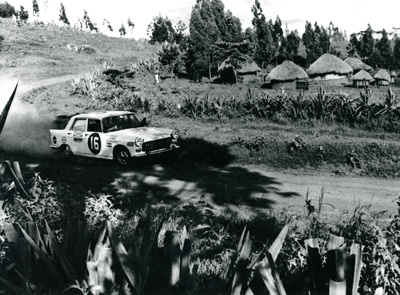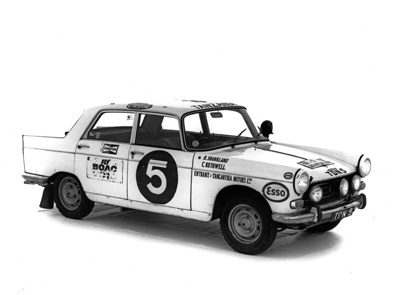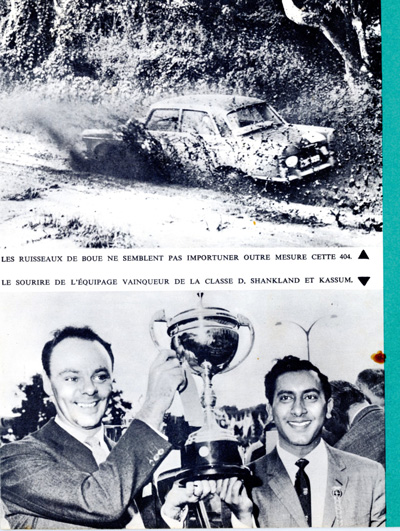-
MenuBack
-
IXO BOX
-
-
24h00 Le Mans
-
Alpine A110 1600S
-
Lancia 037
-
-
-
FULL KIT
-
-
FULL KIT
-
-
- ACCESSORIES
- MAQMADON by Ixo Collections
-
ASSEMBLY GUIDES
-
Undefined title
-
-
-
Blog Ixo
-
- FAQ
The Peugeot 404 and 504 in exotic rallies
The 203 was the first to be noticed, winning the Cape Town-Alger Rally in 1951, then the Tour of Algeria in 1954, the Morocco Rally in 1955 and the Senegal Rally in 1958. The 403 that succeeded it won only category victories, while the 404 achieved an impressive record of success, notably in the East African Safari (1963 and from 1966 to 1968). This was followed by the 504's victories in the Ivory Coast Bandama (1974 to 1976 and 1978), the Safari Rally (1975 and 1978) as well as in Morocco in 1975 and the Ivory Coast in 1976.

In 1968, Zbigniew Nowicki and Paddy Cliff won the East African Safari with their fuel injected 404. © IXO Collections SAS - Tous droits réservés. Crédits photo © Peugeot
Four historic victories
Peugeot made its debut at the East African Safari in 1954 where it won its category with a 203 saloon, a success that was repeated in 1959. The 404 made its debut in this race in 1961 and immediately finished 3rd in its category. The following year, the team composed of Zbigniew Nowicki and Paddy Cliff finished 2nd overall; Peugeot won the team classification. In 1963, the same two team members won the event, which was then contested over 5,200 km. This first Peugeot victory was all the more resounding as only 7 cars finished out of 87 starters! The 1964 edition only offered a class victory to the 404 of Shankland and Kassum, then the 1965 edition saw a fine 2nd place overall for the car of Ian Jaffray and Simon Bathurst, while Peugeot won the Manufacturers' Cup. In 1966, Bert Shankland and Chris Rothwell won for the second time in their fuel injected 404. It was the same team that won the next edition. In 1968, Novicki and Cliff won the event again.

At the 1967 East African Safari, all twelve Peugeot 404s entered were classified, including the one entered by Bert Shankland and Chris Rothwell for Tanganyika Motors. © IXO Collections SAS - Tous droits réservés. Crédits photo © Peugeot
The 504 takes over
In 1969, the 504 entered the racetrack, entered by the factory competition department. The following year, the 504 took its first African victory in the Ethiopian Highland Rally with the local Mamalingas-Nadir team. From 1971 onwards, the 504 won the major African events with regularity, which became a showcase for Peugeot in the emerging markets in the face of competition from Japanese manufacturers. At this time, Peugeot became more officially involved and took over from Fred Harris' Marshall's team, the importer of the lion brand on the African continent, which was now in charge of race assistance for the 504s entered in Africa. At the same time, the local drivers were gradually replaced by Europeans, including Timo Mäkinen, Hannu Mikkola, Jean Todt, Jean-Pierre Nicolas and Henri Pescarolo to name but a few... In 1975, the 504 saloon with a 4-cylinder engine gave way to the 504 Coupé with a V6. The 504's African adventure continued successfully until 1988, with private drivers such as Alain Ambrosino. At the same time, the new Peugeot Talbot Sport team started to enter the fabulous 205 Turbo 16.

The class victory of the Peugeot 404 of Bert Shankland and Ken Kassum in the 1964 East African Safari was celebrated by the press. © IXO Collections SAS - Tous droits réservés. Crédits photo © Peugeot
The Queen of African Races
The East African Safari is a high-level event in which Peugeot won seven times between 1963 and 1978, i.e. every other edition in fifteen years! It was created in Kenya in 1953 by Eric Cecil, Neil Vincent and Ian Graigie on the occasion of the coronation of Queen Elizabeth II of England, hence its first name of "Coronation Safari". The race was renamed the East African Safari the following year and became the Safari Rally from 1975. From the outset, the East African Safari was considered one of the most difficult events for drivers and their cars, so much so that most of the major manufacturers made a point of entering it to establish their reputation. Winning the East African Safari means getting through the hell of the broken and trapped tracks, but also the torrential rain and mud. To achieve this feat, competitors must show speed, stamina and resourcefulness in repairing the numerous damages to their vehicles. In the early years, the race took place over a distance of just over 3,200 km around Lake Victoria, starting in Nairobi and running through Kenya, Uganda and Tanganyika (later Tanzania). Initially reserved for production cars, the EAS was included in the FIA's international rally calendar from 1957.

In the 1974 London-Sahara-Munich Rally, the 504 n° 58 of the Aseptogyl Team driven by Christine Dacremont and Yveline Vanoni (here 3rd and 1st from the right) came 2nd.© IXO Collections SAS - Tous droits réservés. Crédits photo © Peugeot
Modified for the track
Most of the 404s that competed in the East African Safari were entered by local Peugeot dealers such as Tanganyika Motors who won the 1966 and 1967 editions and Marshal Ltd. who won the 1968 edition. The models used were from the series, with right-hand drive, as these countries were former British colonies. Several modifications were made, such as raising the ground clearance and strengthening the suspension. In addition, a steel plate protects the lower engine assembly and better suited tyres for the track are fitted. Finally, an additional fuel tank was placed in the trunk and long-range headlights were installed on the front grille.
Other 404 victories
During the period from 1961 to 1968, the Peugeot 404 scored numerous victories at the end of the world. It won the BP Rally in 1961, as well as the Mobil Economy Run, the Nile Rally and the Uganda Rally the following year. In 1963, she again won the Mobil Economy Run, the Shell Rally, the Trans-Canada, and the Rally of Argentina. In 1964, its successes were achieved in the Uganda Rally and the Caltex Rally, while in 1965 it again won the Mobil Run and the Rally of Argentina. In 1966, the 404 won the Congo Rally and the following year it won the Uganda and Cyprus Rallies. In its final season, 1968, it won the Rally of Argentina, Paraguay and Rwanda.
Share this post





 Français
Français Anglais
Anglais Allemand
Allemand Espagnol
Espagnol Italien
Italien Portugal
Portugal